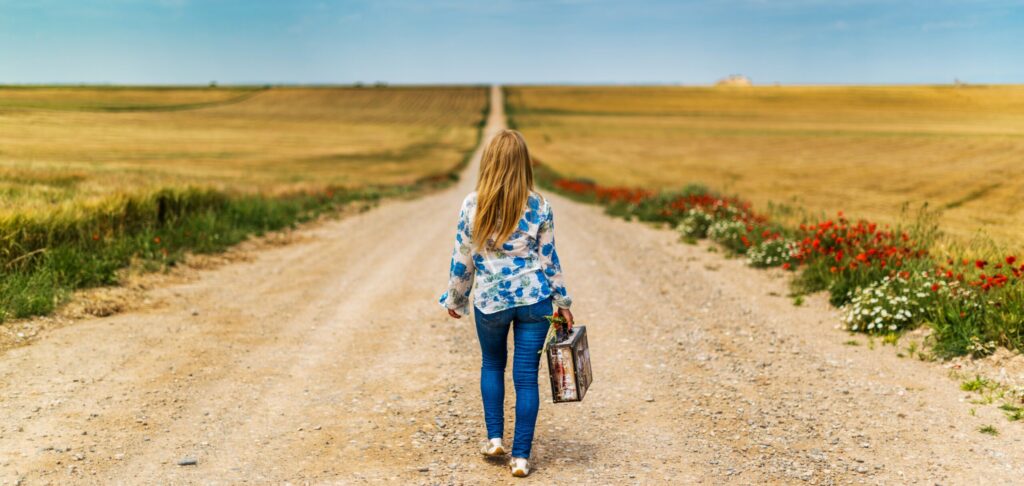A GoBeyondia Journey
Alex had been putting off the trip for months, cycling through the same doubts every time they opened travel websites. As a freelance graphic designer in Portland, they finally had the time and savings for a long-dreamed-of solo adventure. But every forum post and article about solo travel seemed to focus on safety tips and “how to meet people in hostels”—as if the main challenge was avoiding loneliness rather than finding meaningful experiences.
“I don’t want to just survive traveling alone,” Alex confided to their therapist. “I want to actually connect with places and people in ways that feel authentic, not forced. But I have no idea how to do that without feeling like I’m intruding or being awkward.”
Their therapist mentioned hearing about GoBeyondia from another client. “She said it helped her find experiences where being solo was actually an advantage for deeper cultural connection.”
Skeptical but curious, Alex decided to explore what that could mean.
Evoke: Reframing Solo Travel as Authentic Connection
GoBeyondia’s homepage surprised Alex with its approach to solo travel. Instead of safety warnings or socializing strategies, they found a gentle prompt: “What draws you to traveling alone, and what concerns you most about the experience?”
Alex typed honestly: “I love the idea of complete freedom to follow my curiosity, but I’m worried about feeling isolated or awkward when I want to connect with local culture. I don’t want to be the lonely tourist taking photos of everything instead of experiencing it.”
The Beyondia AI travel companion responded with unexpected insight: “That awareness actually positions you perfectly for authentic solo travel, Alex. Many solo travelers find that traveling alone makes them more present and approachable to locals who appreciate genuine curiosity. What aspects of local culture are you most curious about exploring?”
This conversation shifted Alex’s entire perspective. Instead of treating solo travel as a limitation to overcome, the AI explored it as an opportunity for deeper engagement. They discussed Alex’s interests in local art scenes, their fascination with how communities preserve traditions, and their desire to understand places through the eyes of people who actually live there.
“You know,” the Beyondia eventually offered, “there are destinations where solo travelers are especially welcomed because locals appreciate unhurried conversations and genuine interest in their community stories. Would you like to explore places where your solo status could actually facilitate meaningful cultural connections?”
For the first time, Alex felt excited rather than anxious about traveling alone.
Explore: Finding Community Through Authentic Interest
Following their conversation, Alex dove into GoBeyondia’s content with a new framework. Instead of solo travel survival guides, they found destination information that treated solo exploration as an opportunity for genuine cultural engagement.
The Colombia guide didn’t just mention safety considerations—it explained how solo travelers could participate in community art projects in Medellín, where locals actively seek cultural exchange with visitors who come with genuine interest rather than group tour agendas. The Scotland section detailed how solo hikers could connect with Highland communities through traditional storytelling evenings, where being alone actually made it easier to be included in intimate local gatherings.
What resonated with Alex was the emphasis on reciprocal connection. The guides explained how solo travelers could contribute meaningfully to communities—through their skills, perspectives, or simply their authentic interest in local stories—rather than just consuming experiences.
“I started understanding that loneliness in travel comes from superficial interactions, not from being alone,” Alex reflected later. “Beyondia showed me how solo travel could actually create space for the deeper connections I was seeking.”
They spent weeks studying different approaches to cultural engagement, understanding how their graphic design skills could be relevant in various communities, and learning about places where solo travelers were welcomed as cultural bridge-builders rather than tourists to be entertained.
Through the platform’s nuanced guidance, Alex found themselves drawn to rural Scotland, where solo travelers could participate in traditional Highland storytelling preservation projects while staying with families who valued unhurried cultural exchange.
Planning: Solo Travel as Cultural Contribution
When Alex was ready to plan their journey, GoBeyondia’s approach to solo travel proved invaluable. The AI companion explained how their graphic design background could help a Highland community document traditional stories through visual narratives. It discussed the social rhythms of rural Scottish life, where solo visitors who showed genuine interest in local culture were naturally included in community activities.
The platform reframed solo travel challenges as opportunities. Language barriers became chances for creative communication. Meals alone became opportunities to engage with local food traditions. Solo hiking became space for reflection and unexpected encounters with locals who appreciated unhurried conversations.
“Other platforms treat solo travel like a problem to solve,” Alex noted. “GoBeyondia helped me understand it as a different way of engaging—one that could actually create more authentic connections than group travel.”
The Experience: When Solo Becomes Community
Three months later, Alex found themselves sitting by a Highland fire in the village of Applecross, sketching story illustrations while elderly locals shared tales that had been passed down for generations. Their solo status had made them an immediate curiosity, then a welcomed contributor to the community’s storytelling preservation project.
The cultural preparation they’d done through GoBeyondia transformed every interaction. When village elder Morag invited Alex to document her grandmother’s stories through visual art, they understood the honor being extended. When local families included them in evening gatherings, Alex knew how to contribute to conversations rather than just observing.
Being solo became an advantage rather than an obstacle. Alex wasn’t bound by group schedules, so they could spend extra time when conversations became meaningful. They weren’t part of a tourist bubble, so locals engaged with them as an individual rather than part of a group. They weren’t rushing between planned activities, so unexpected cultural opportunities could unfold naturally.
“The connections I made were deeper than any I’d experienced in group travel,” Alex explained. “Because I was solo and genuinely interested in their stories, people opened up in ways that wouldn’t have happened if I’d been part of a tour group.”
Evolve: Carrying Community Connection Forward
Returning to Portland, Alex faced a different challenge than other conscious travelers: how to maintain the sense of community and connection they’d discovered through solo travel. GoBeyondia’s Evolve section provided exactly the guidance they needed.
The platform offered practices specifically designed for solo travelers who’d experienced deep cultural connection. Alex used reflection exercises to process how solitude had actually facilitated community engagement, learned how to maintain relationships formed during solo travel, and discovered ways to apply solo travel confidence to local community involvement.
The AI companion helped Alex recognize the transformative aspects of their experience. Solo travel had taught them that authentic connection comes from genuine interest and cultural curiosity, not from having companions or following group activities.
Most importantly, the Evolve content helped Alex understand how solo travel skills—presence, openness, cultural humility—could enhance their local community engagement in Portland. They started volunteering with immigrant community art projects, using the same approaches to authentic connection they’d learned in Scotland.
“The trip showed me that loneliness isn’t about being alone,” Alex explained. “It’s about superficial engagement. Solo travel taught me how to connect authentically, which has completely changed how I engage with my own community.”
One Year Later: Solo but Never Lonely
Today, Alex describes solo travel as their preferred way to explore the world—not because they avoid people, but because it creates space for the authentic connections they value most.
They’ve completed two more solo journeys through GoBeyondia, each time using their graphic design skills to contribute to local community projects while experiencing deep cultural exchange. But more significantly, their approach to connection—in travel and daily life—has fundamentally shifted.
“Beyondia didn’t just help me plan solo trips,” Alex reflects. “It taught me that solo travel isn’t about being alone—it’s about being present and open to authentic connection. That’s a skill that transforms how you engage everywhere, not just when traveling.”
The story illustrations they created in Scotland now hang in their Portland studio—not as travel souvenirs, but as reminders that meaningful connection comes from genuine interest in others’ stories, whether you’re traveling solo across the world or engaging with neighbors in your own community.
The 3E Framework for Solo Travelers
Alex’s story demonstrates how GoBeyondia specifically serves solo travelers seeking authentic connection:
Evoke reframed solo travel from a limitation to overcome into an opportunity for deeper cultural engagement. The AI travel companion conversation revealed that Alex’s concerns about loneliness were actually desires for meaningful connection.
Explore provided cultural contexts where solo travelers are welcomed and valued, showing how individual skills and genuine interest can facilitate community engagement rather than tourist consumption.
Evolve helped Alex integrate solo travel confidence into daily life, recognizing that the skills for authentic connection while traveling alone apply to community engagement everywhere.
“It’s the difference between traveling solo to avoid people and traveling solo to connect more authentically with people,” Alex concludes. “Beyondia showed me that conscious solo travel isn’t about independence—it’s about creating space for the kind of genuine cultural connection that’s harder to achieve in groups.”
For Alex, that understanding transformed solo travel from a source of anxiety into a pathway for the most meaningful connections they’d ever experienced—both while traveling and in their daily life back home.


